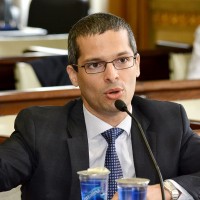Thank God, the insanity only lasted three days. The City Hall of São Paulo, the biggest city in South America, surrealistically ordered taxi drivers to avoid conversing with their clients about “polemical themes” such as “sportive passions,” “political convictions,” “faith and religious cults,” “personal behavior options,” “private problems,” or “problems of taxi drivers’ category.” Conversation regarding these topics could result in a fine of BRL 35.52. The ordinance was enacted on Monday, January 18th and was overturned on Thursday, January 21st, after public outrage.
The adoption of such a rule was clearly influenced by the heated debate surrounding taxi drivers, their unions, and Uber. Uber is an extremely popular alternative taxi service. Taxi drivers in São Paulo are heavily burdened by the paulistano stereotype – the lack of taxis, kindness, air-conditioning, credit card options, and other benefits that Uber offers to their clients.
While the City Hall may have had “good intentions” when attempting to regulate taxi drivers’ speech, their actions were a form of censorship. Censorship violates the basic freedom of expression clause and direct prohibition of censorship expressed in Article 5th, IV/IX of the Brazilian Constitution, along with Article 220, caput and the 2nd paragraph of the Brazilian Constitution.
The regulation is dangerous not only for its blatant constitutional violations, but also for the obscure reasons behind drafting such a regulation. The rule was based on a dangerous ideology of shaping speech according the State’s interests, masked under the pretext of “avoiding put[ing] the passenger under stress.” Under the regulation, the taxi driver must “remain in silence” and “express only about themes suggested by clients” –excluding the prohibited “polemical themes.” The City Hall’s intention appeared to be to turn taxi drivers and the taxi service into a strictly politically correct environment through a command-and-control strategy. The regulation was shocking because it was both bold and unreasonable: what authority did the City Hall have for such censorship? Why target the speech of the taxi driver and not the speech of the client? The City Hall of São Paulo probably knew regulating client’s speech went too far.
Through the regulation of themes, City Hall was under a presumption that the client or taxi driver could not control the topic of discussion. The client and taxi driver should have the right to engage or refuse any conversation they so wish. The City Hall’s actions were contrary to the current freedom of expression trends enforced by the which Brazilian Supreme Court. Especially in relation to the overturning of the Press Act and and the dismissal of prior authorization to publish biographies.
Compare this case to the the U.S. Supreme Court’s decision in VA Pharmacy Board v. VA Consumer Council, in which Justice Blackmun defined that by passing a statute that prohibited pharmacists from advertising certain products, Virginia state violated the First Amendment. Blackmun famously stated once one “[s]ingles out speech of a particular content and seeks to prevent its dissemination completely,” freedom of expression has been violated. The regulation sought to censor taxi driver’s speech resulting in content based censorship that violates the Brazilian Constitution. The City Hall’s regulation is a clear example of a “Nanny State,” see David Harsanyi’s definition, a phenomenon that must be criticized at every turn. The heated debate surrounding taxi drivers and Uber is not enough to damper the essential freedom of expression ideologies engrained in democracy.

